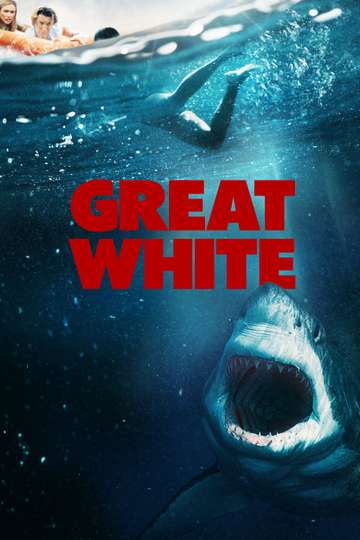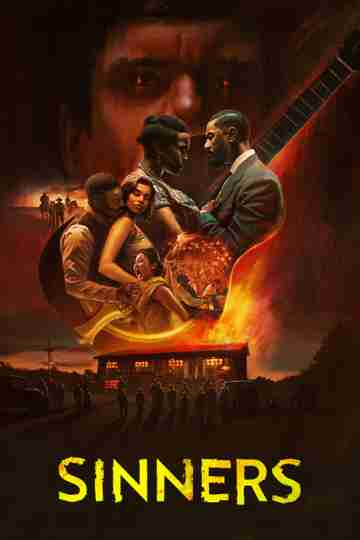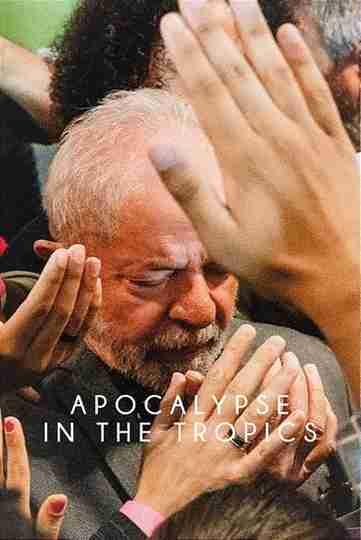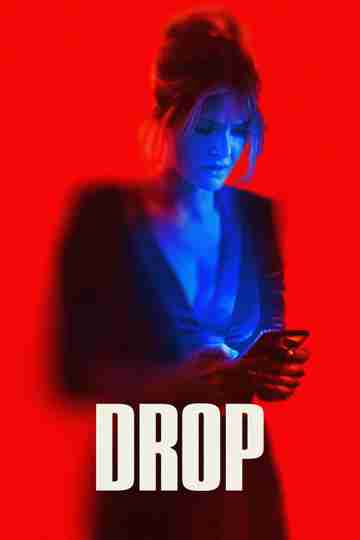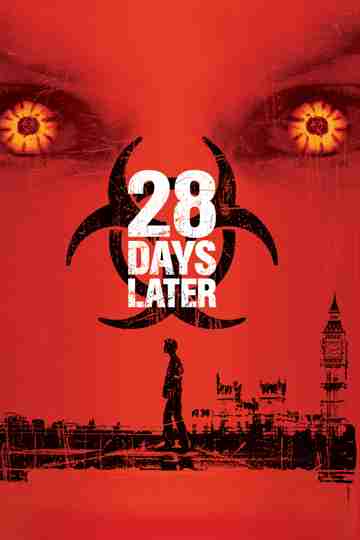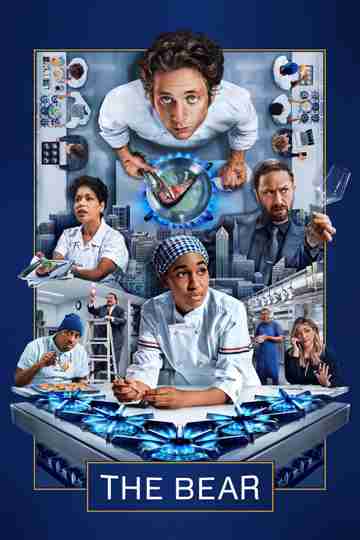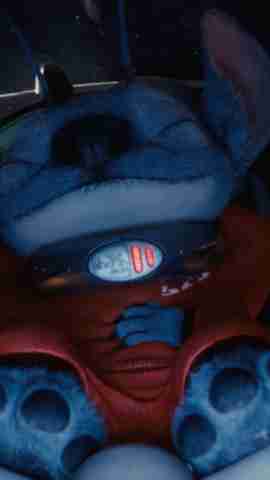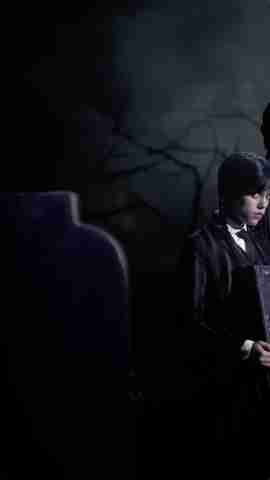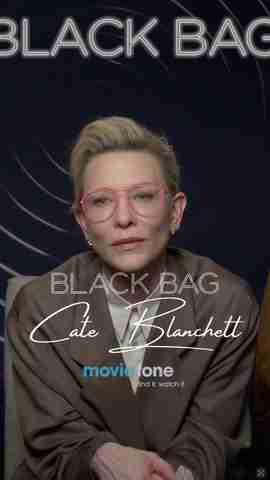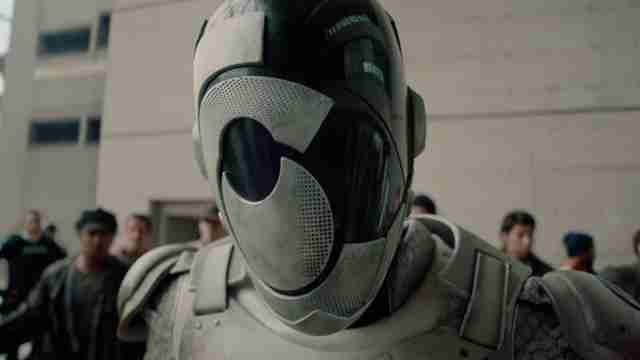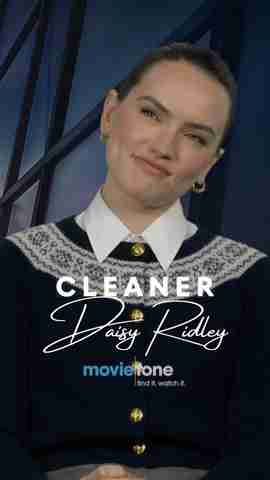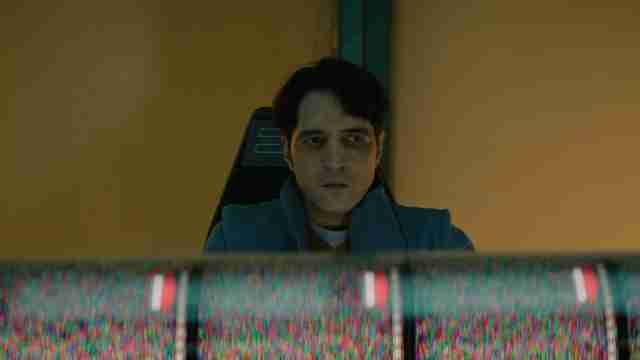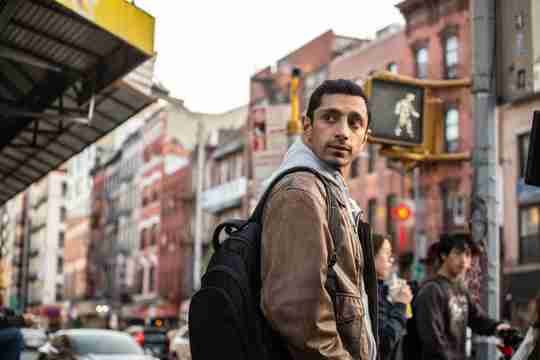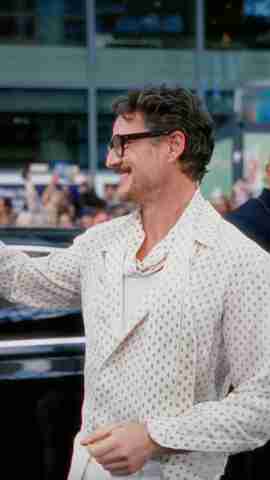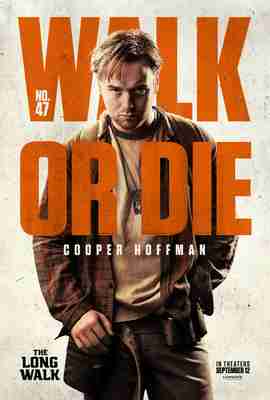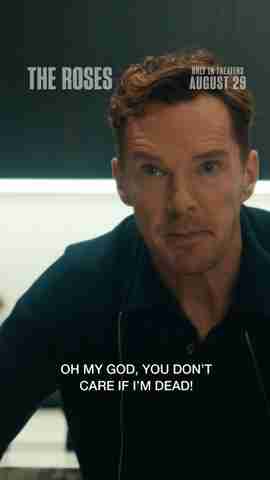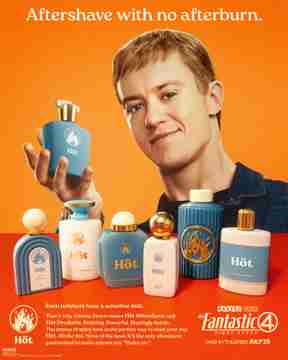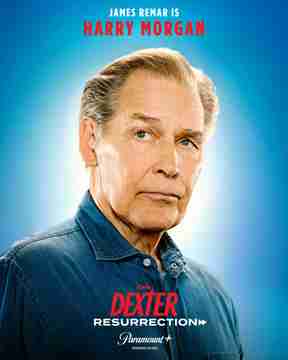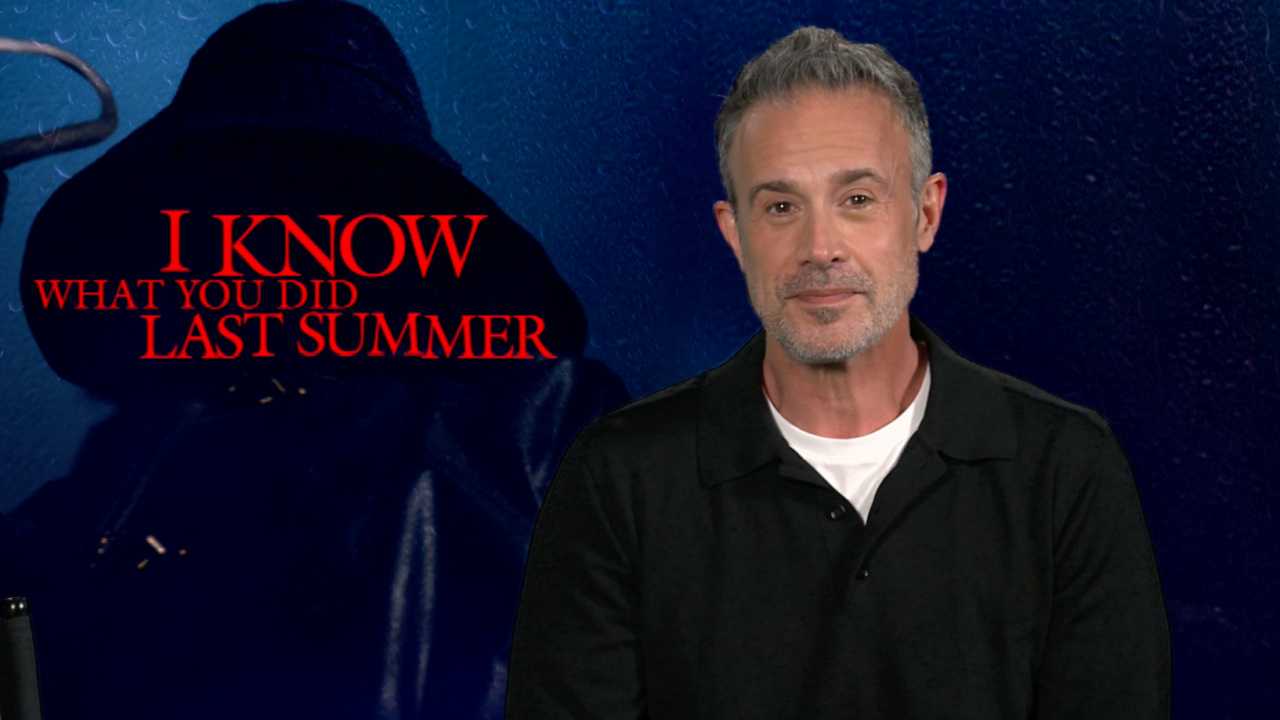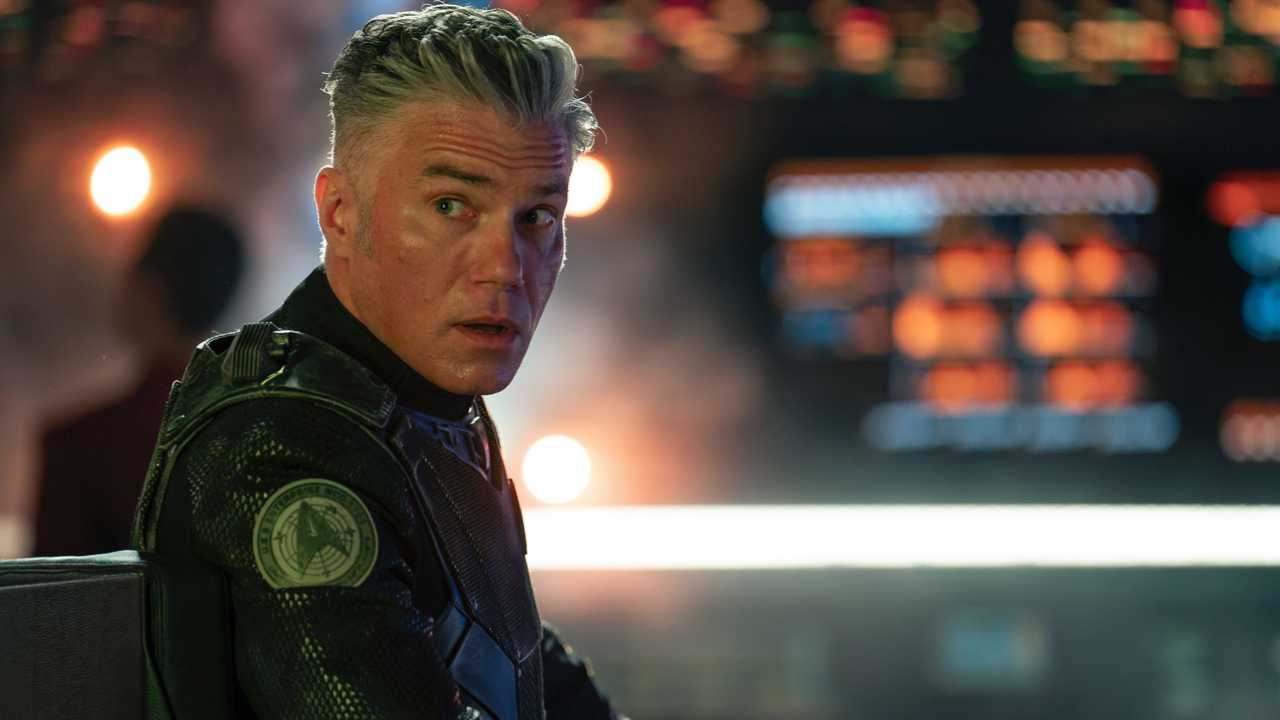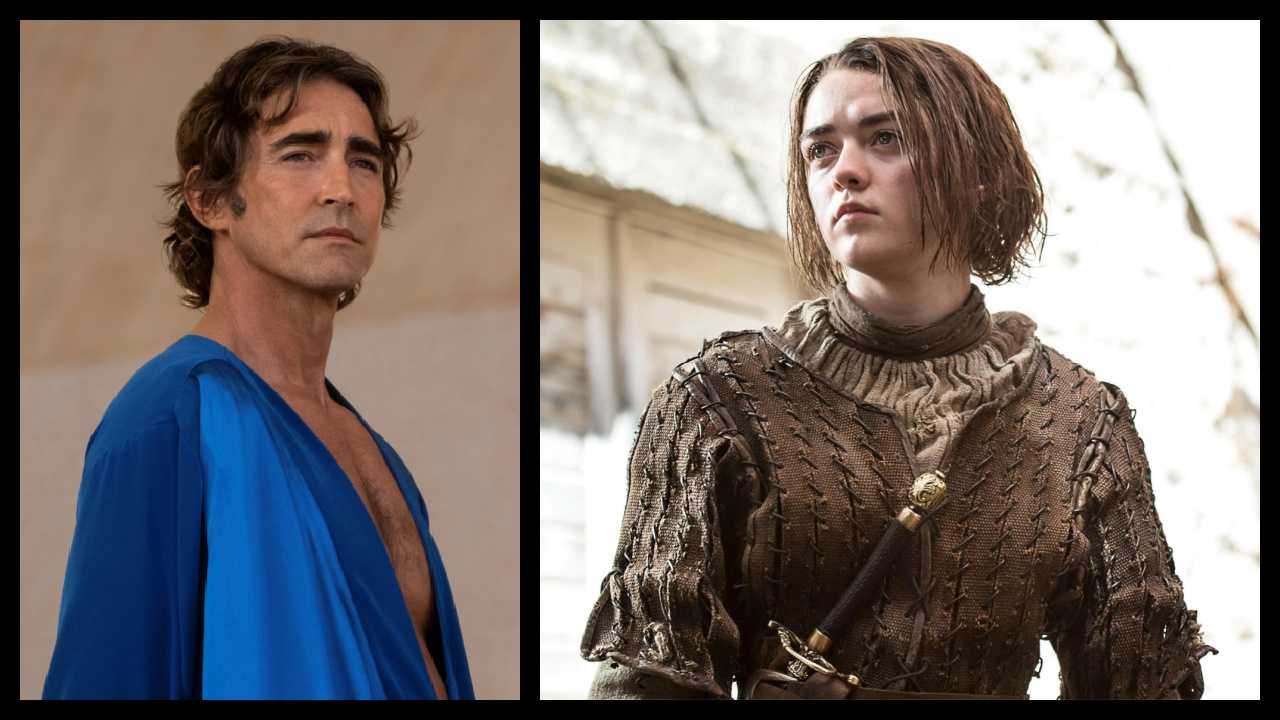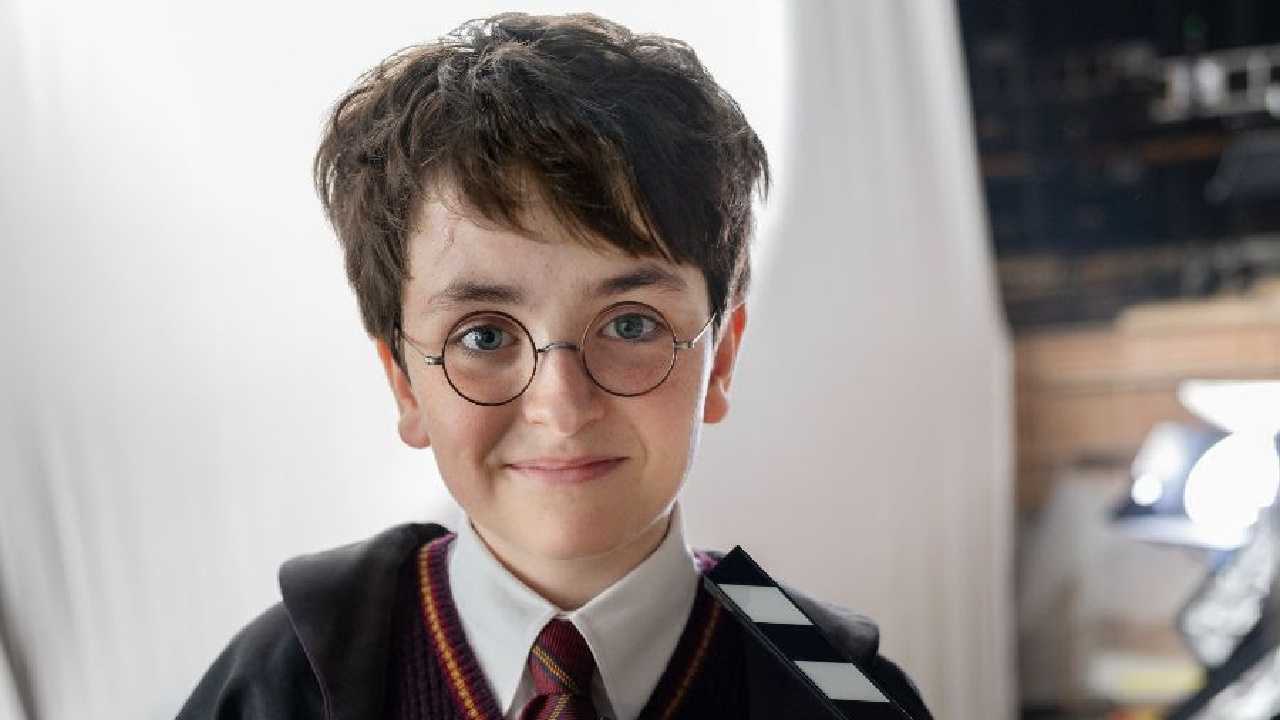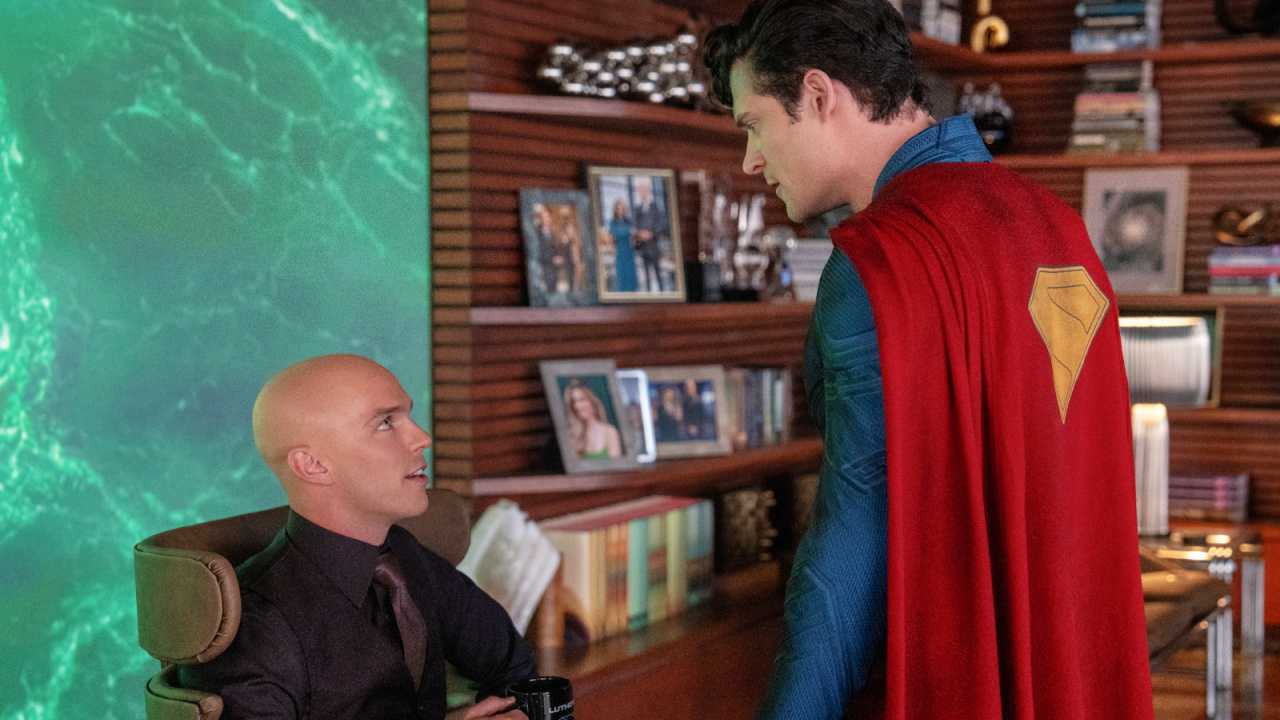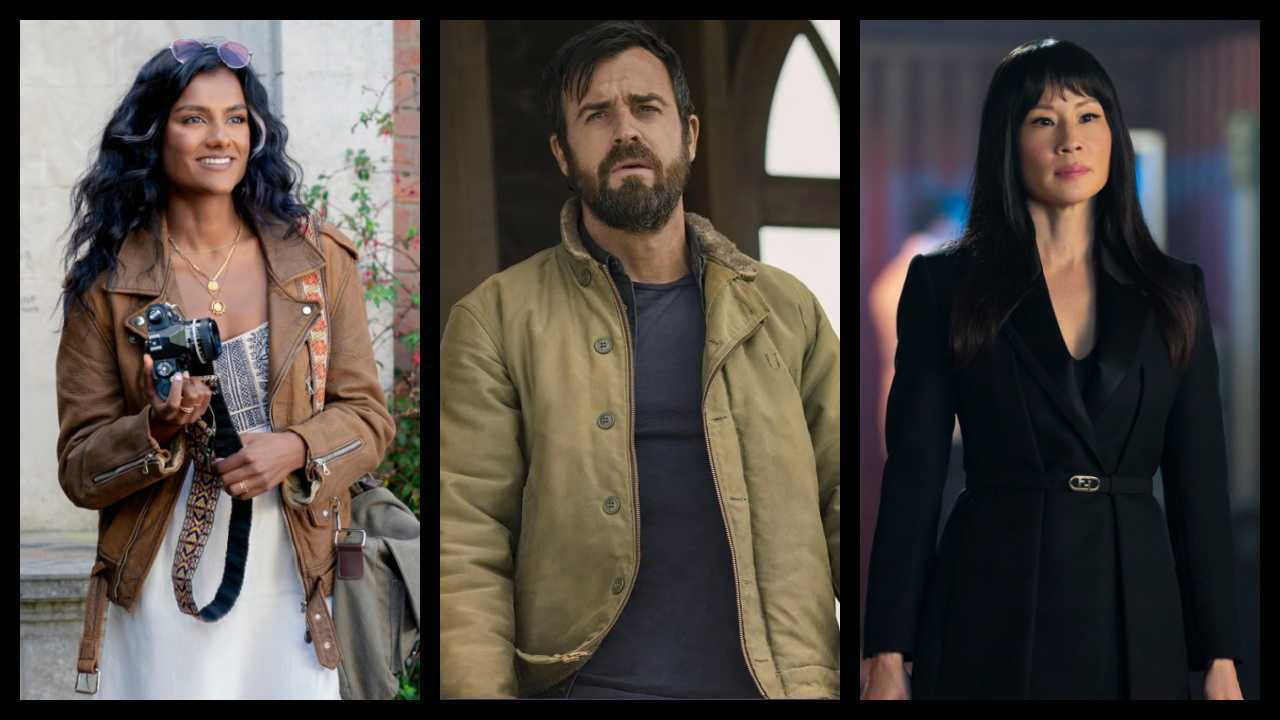‘Great White’ Stars Katrina Bowden and Aaron Jukabenko Talk About Their New Survival Thriller
Katrina Bowden and Aaron Jukabenko talk about shooting on location on a reef and the challenges of acting underwater.
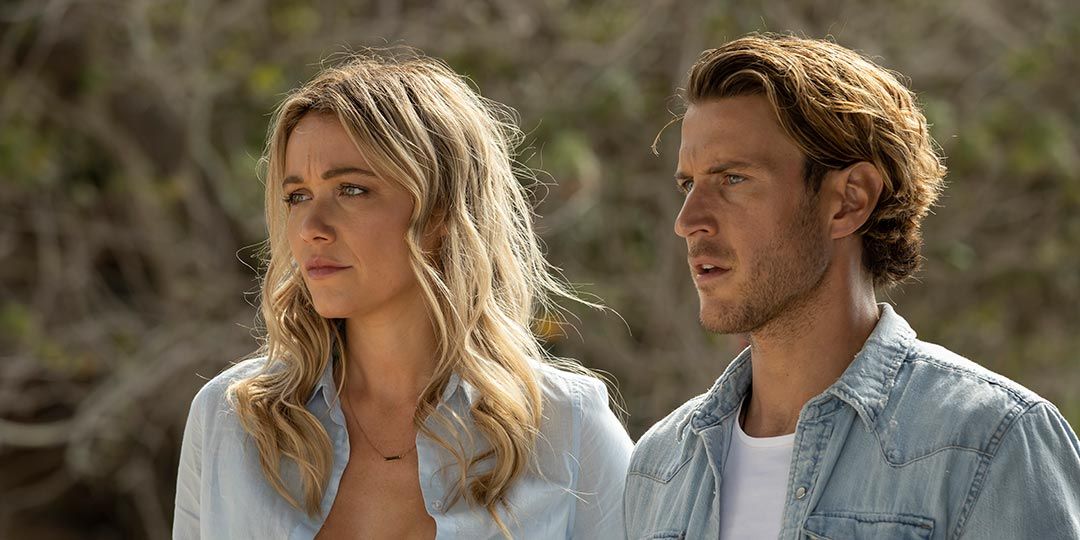
Katrina Bowden and Aaron Jukabenko in 'Great White'
In the new movie ‘Great White’ five people in a life raft are stalked by sharks when disaster strikes on their day trip to a coral reef. Katrina Bowden and Aaron Jukabenko play Kaz and Chris, the owners and operators of the tour company, and the two actors took time to talk to Moviefone about their new movie.
First up, Katrina Bowden describes her character Kaz, and shares some of the challenges of working underwater.
Moviefone: Can you describe your character Kaz?
Katrina Bowden: She's an American who now lives in Australia. She used to work as a triage nurse, so she's a tough cookie. She's seen a lot and handles pressure really, really well. And she's that kind of person who really takes control in a bad situation. And she's dating Charlie, who is her boyfriend and just the love of her life, and they have this tourism company together. And he's a little bit more of a free spirit type of guy, so she really does help to ground him. And I was just really drawn to this character because she is just such a strong female character. But given her nursing background, she has this very good soft side, that she knows how to talk to people and really get through to them. And she's just a good people person in general,
MF: She's got a level of emotional intelligence that serves to de-escalate the tension, and she keeps some of the guys from coming to blows, at least early on.
Bowden: Yeah. She's able to defuse situations pretty easily. She really understands the dynamics between people and, especially in this movie with our main cast, there are very different types of personalities, and she's able to kind of navigate that all and handle it in a really smart way.
MF: You shoot a lot of scenes underwater in it. Can you talk a little bit about what that's like for you as an actor? I assume that there are divers off screen with extra respirators, for instance. How hard is it to act underwater?
Bowden: Really hard. I wasn't expecting it to be easy by any means, but I was quite surprised when I was actually in it doing it, how challenging it was. And then there were challenges that I wasn't really prepared for, I guess. We did a lot of training. We did scuba training and breath hold training. We had a big stunt team and diving team who were there with us every step of the way. And our divers were just nearby with respirators and just to help us out if we needed help in the moment. I worked directly with our stunt team just to choreograph all of the underwater swimming scenes, because it took a lot of practice to get the beats of the scenes right. Because once you're under water, you can't see anything. I mean, we've all opened our eyes under water, but it's different when you're trying to hit a mark or hit the correct eye line or look at something, at a specific spot, and everything kind of becomes a blur.
And so factor that in with having to hold your breath for long periods of time and actually swim into these set pieces that we had in these aviation tanks. It was just a lot. So it took a lot of practice runs before we could actually shoot it. So that was a bit of a challenge, but it was so much fun. And then, we were breathing on the rig of the oxygen tank underwater. But the problem with that is that when your lungs are filled with the air, your body wants to float up, but there are scenes where we had to remain at a certain area for the camera. And so in those scenes they would tie weights to my feet so that I would be weighted down, which is also kind of scary on its own. So there were just a lot of little challenges, but it kind of just made the whole experience that much more fun, because I've never done anything like that.
MF: I know once an actor does action choreography, that's something that they can go into again. So is this now something you get to tick off on your resume? As in "Oh, I've done underwater scenes and I'm ready to do them again when that comes up."
Bowden: I hope so. I would love to do more of stuff like that. I mean, I think action choreography in general is just really fun and really cool, but also a big challenge. So after shooting this movie, I do feel like I'm kind of prepared for anything like that that comes my way.
MF: When you shoot the scenes on kind of the shipwrecks, that was out near one of the islands, wasn't it? You shot scenes in a stage, but you were out on location for a while, weren't you?
Bowden: We were on location for the majority of the film. We had a studio stage set that was only for the nighttime wrap scenes. So we shot at this island called Peel Island, which is a deserted island 45 minutes away from the main shoreline. And it was kind of rough. It was hot, it was buggy and there were sharks. Actual, real sharks surrounding the whole area. So we didn't really go into the water that much there, but that was a really fun location. Absolutely stunning and beautiful, but there's like no running water there or anything there at all. So it was definitely an interesting... I think we actually started there, too. It was our first week we were there, so it was like just diving right on in. I
MF: I love that there are sharks nearby. It sounds like the whole island decided "We're going to go method on this. We're going to actually put sharks in the water."
Bowden: Well, it's Australia, so they're there. Everything scary is there. We would take this fishing boat over to Peel Island in the mornings and the fishing boat would hang out off shore and fish just for fun while they waited for us. And they were telling us that bull sharks would just swim around the boat catching or stealing the fish that they would catch. And I thought, "Well, that's great to know that we're all just in little rafts around this boat where there actual bull sharks nearby." It's a little scary.
MF: In the scenes where you're on the shipwrecks, what are you doing to protect yourself? Because I thought, oh my God, that's tetanus city. All I could think is, how are you not getting just scraped to shreds?
Bowden: Well, we had our stunt doubles do a lot of the wide shots of us climbing onto that real shipwreck. And then our art department recreated the shipwrecks for the closeup shots. So they weren't actual rusty set pieces, they were rubber. I mean, they weren't comfortable at times, but we had little platforms to help us make it look like we're actually scrambling up on these things and getting bloody. So, that was all the movie magic of our set design.
MF: When you're in a remote shoot like this, what are the costuming resources like? And are you worried about getting sunburn and that kind of thing?
Bowden: Well, sunburn was definitely an issue because the sun is pretty relentless down there, but we were supposed to be sunburned in the movie. But no. Our makeup team made sure that we were not sunburned. They slathered us with sunscreen every chance they could get. And then as far as wardrobe goes, usually for a movie like this, when you only have one or two outfits, you have multiples. So at varying different parts of a film like this, your wardrobe is either wet or dry or dirty or bloody, so they have different versions of your wardrobe that you swap in and out of. And then there were times where we had to shoot scenes, but were dry and then going into the water. So they would have multiples of that outfit if we have to do multiple takes so we could change and then do it again. It's a whole lot that goes into it that people don't even realize they think about. But yeah, we have many, many multiples of these outfits.
MF: What did it feel like as you're first reading the script? Is it as tense on the page as it is in the movie?
Bowden: I was super excited just because I've never done a shark film and I was excited at the idea of it just off the bat. And then when I started reading it, I realized it wasn't your run of the mill big jump scare, bloody, boring shark movie. I mean, it has its elements of course, but it really focuses more on the quiet kind of suspenseful moments that happened in between the big action scenes.
And I really loved how the characters were really a driving force in the movie. And they're very layered and it really is like a survival film inside of a shark movie. So you really care about these characters and you really want them to just survive. And that really stood out to me when reading the script. And then when I started speaking to Marty, our director, he really, really wanted to focus on the characters and make sure that we were all really well thought out characters so that the audience would actually care. Because you want to care that these characters survive and you want to care about what happens to them. So I found that really cool and really drew me to signing on.
MF: Has working on this movie given you a new appreciation or a new fear of sharks? I'm sure everybody's asking you that question.
Bowden: Yes. That's the big question. I mean, before I started this, I've always been afraid of sharks. I think it's kind of natural human nature to be afraid of sharks. When we're in the water, that's not our territory at all. We have no idea where they might be and it's their turf. So I've always been a little afraid of sharks. I definitely learned a lot about sharks while shooting this movie that kind of made me a little bit less afraid of them. Just kind of learning about what their patterns are and how they behave. But no, I'm still scared of sharks, for sure. Not going to stop me from going in the ocean.
MF: There's some subtle moments in this movie. When Kaz goes to go and get that paddle, as opposed to just the quick overhand splashing, she's almost stealth swimming. How did you come up with that?
Bowden: Right. Well, I guess in that moment, so she decides to go into the water when they're all kind of arguing about who should go in. She just slips on in because she knew that no one would let her if she put her hand up and said, "Me." So she just decides to make it as quiet as possible. And I think that was a choice because it was nighttime and that's kind of shark hunting time. So she wanted to keep it as low profile as possible and just kind of sneak by and hope for the best, instead of just frantically swimming as fast as she could. I mean, it definitely took her longer to get to the paddle, but it was definitely a choice because she didn't want to disturb the waters in that moment.
Next, Aaron Jukabenko talks about his character Charlie and the perks of working on a tropical reef.
Moviefone: Can you describe Charlie a little bit?
Aaron Jukabenko: Yeah. He's a warm, lovable guy who sometimes can be a little more focused on himself and just having fun than the sort of things that maybe he needs to pay a little more attention to. He's got a beautiful, caring girlfriend who is... she's just yearning for a little more connection, but he just doesn't even recognize that. So his journey is, is I guess, starting to look at things that need a little more grounding in his life.
MF: But he remains calm in a crisis. Is that something that you share with him, or is that something you have to access and a different side that maybe you don't necessarily have?
Jukabenko: Look, I feel like out of any character I've played, Charlie feels probably closest to who I am, and I'm not saying I'm going to go save everyone on a shark or anything like that. I probably won't do that, but I don't know. I think I try to come at things with a little bit of peace, and I think he does that too.
MF: What's your attitude towards sharks, because in the States we have a little bit of attitude, like, "Oh an Aussie like Charlie, he'll take care of that shark, no problem. It's just another day for him." Is that what it's really like, or is it you're just as worried about them as we are?
Jukabenko: I think you always have to be cautious. Australia is a beast of its own. I grew up in Frankston, but eventually when I was sort of about 14, 15, not sharks, but I woke up one morning to have a brown snake in my bedroom, and they will kill you in probably 10 minutes. So I think in Australia, depending where you live, there are some very real things. I'll never forget the first time I went to New Zealand. It's so close, and I'm sitting there with this beautiful waterfall, this river, and I'm walking through the grass, and everyone's bare feet. I'm like, "All right, we're just doing this." There's no snakes there. And then we're climbing this wall where the waterfall is, and everyone's putting their hands in the cracks and I'm ready for these spiders to come out and bite you, because in Australia, you have to be careful of those sort of things. Sharks included.
MF: That's the running joke, right? That animal in Australia is trying to kill you?
Jukabenko: Absolutely. Yeah.
MF: You say Charlie's close to you, that means of course you can fly a plane, right?
Jukabenko: (Laughing) Not for all the money in the world. No, you know what? I had a date in a plane. This girl, she's a pilot, and she took me out and thought it would be a great idea. And I don't know if it's illegal, so I don't know if I should say too much about it, but she's letting me go too. She's letting me fly and I'm doing flips, doing turns so high up in the sky that it didn't really matter, but she really shook the life out of me by doing some low flying. And I didn't touch that because when you're flying up high, everything just feels slow and sort of fun, but when you're down low, gee, that was scary. Yeah.
MF: There's a lot of filming that you do underwater, and I'm always curious for an actor, what are the mechanics of that? How long can you do the takes? Are you switching setups while you're underwater? Could you talk a little bit about that process of just how much that complicates things?
Jukabenko: Yeah, yeah. Having no oxygen certainly can be a complication, right? I did a job before at Tidelands where we had a guy, Josh Randall, come out and train us with underwater breath holds, and basically all of it was about getting heart rate down, getting sort of that peace amongst chaos, that sort of, "I can sort of control my heart rate a little more. I can really get that down." And so that when you're underwater, you can do a two-minute take maybe. When the cameras are rolling and you're sort of energetic, you lose a lot of that. That might bring you down to 45 seconds, a minute, which is still a decent amount of time to get a shot compared to if you just sort of go in. I probably started 30-second breath holds.
So you definitely have to work on it. You can't just rock up blindly and hope for the best because it definitely is a challenge of its own. You can't really see underwater because... if you've been where we filmed most places, you go with a diving place or wherever and it has goggles. We're doing it without goggles, so after one or two takes, your eyes are red, you can't see. You're a foot away from your actor or whoever you're up against, and you don't even know where they are. So hitting lines, all of it's a little more challenging, but a lot of fun.
MF: was going to ask about that too, because even if it's the first take, everything's still blurry, and it has to be difficult to act off your scene partner a little bit, right? Do you rehearse that and discuss ahead of time, or you just kind of figure that the director is going to capture what they need to capture and give you notes?
Jukabenko: For such a low-budget five-week shoot, really fast sort of experience on it, Marty, the director was very passionate about giving us that chance to have rehearsals. So we went in having these sort of... I think we had a weekly pre-shoot meeting, and we spent every day, we were in there for at least an hour or so rehearsing scenes. So there was already an intimacy and a connection in the scenes that definitely was required underwater. Well, I don't know, there was something magical about just doing it on the day because you're sort of floating and you're there together and you're not hearing the sounds of the outside world. We couldn't see each other that well, so it was sort of touch and holding, and there's this real intimacy in that sort of human, physical connection. So it was a really fun scene to play with.
MF: You've got a lot of scenes out on the beach, out on the reef. Is that feel like a working vacation when you get to do that kind of thing?
Jukabenko: Absolute dream job! We're rocking up in a boat to these pristine coastlines and islands that no one's on, and the water is just... it was that sort of green, clear. It was so beautiful and you've got dolphins dancing by, and yeah, it was really, really magical. And to be honest, that was one of the really attractive things to me about the film as well. I was in Rhode Island and it was snowing. It was the middle of winter when I got the call and I was freezing out there. "Beach film in Australia? Yeah, sounds great."
MF: How does that complicate things when you're that remote?
Jukabenko: It definitely does. It's interesting. Even as simple as there are quite a few scenes where one of us or all of us or whoever gets submerged in water. How do you do that take and take and take again? So it really slows everything down. You've got to shoot everything pre- going into the water, and then you maybe shoot everything where it's at this level or whatever, and so that is tricky. I know there was one scene where we were sort of wet, but not that wet, and we were like, "What do we do?"
And then, I don't know if it was the director or me or costume or whoever it was, but they were like, "Let's just get in the water now so that we don't have to worry about that continuity. We can just be wet from the start" This was our last day of filming, so it probably saved us an hour just in costume changes. Yeah. So it can be tricky. Costume team are wonderful. And yeah, so we got through it.
MF: Do you shoot the set work first, or are you shooting out on the island out on the reef first?
Jukabenko: We did top and tail, actually. And I don't know if that was for weather or just convenience, but we started in the studio and then we went to, I think a beach, or it was... because we had one main beach and then sort of that opening beach was an island, Peel Island. So we were there for a bit. And then we also went to one of the most bizarre places that I filmed at, which was a prawn farm. The water is murky and black. We didn't do anything underwater there, but you have to jump in, and we were swimming to our raft at that point. And you've got like 20 jellyfish just floating by, and these are big, big things. I think Katrina got stung. It was wild.
MF: My last question, now that you've done a shark movie, have you watched a shark movie other than your own since then? And if you're going to watch something like Jaws, do you think "Oh yeah, I know how they made that work"?
Jukabenko: I watched so many going into it, I think I'm on a bit of a shark movie self-ban at the moment. I've just seen so many. It was interesting. Regardless of shark movies, I think that's the curse of being in the industry. I struggle to watch a movie without thinking, "How did they do that," or for me, a lot of it is, "Wow, look at that performance. That's amazing." And so for me, the best film and TV that I watch is something that pulls me out of that. And I'm not going to lie, it doesn't happen often. I don't often just get sucked into the story because the performance or the storytelling in whole does it, and sort of a lot of the time, I still am just my curiosity of the arts is sort of really prevalent.
MF: Those overhead shots where you see the silhouette of the shark in the water, are those drone shots?Or is that VFX?
Jukabenko: No, they had drones. Tony O'Loughlan and the camera team, they were really fantastic because it was so fast. Everything was so fast. They're setting up in just record time. But some of those scenes were actually quite interesting and relaxing because some of the overhead ones are so wide that you can't see us at all. So we're just hanging out floating on a raft in the middle of the ocean. No idea when they're going to call cut, they did give us a radio at one point, but it was sort of still long takes. We were like, "All right, I guess we just get to hang out for this take."
‘Great White’ is in theaters and on demand.
